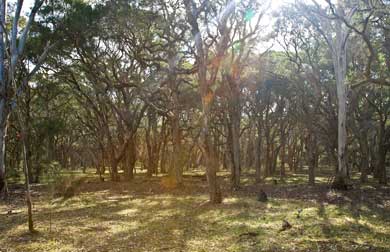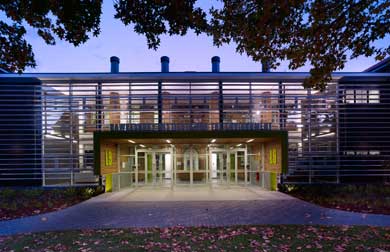Plant diversity critical to long-term ecosystem sustainability

Losing even just a few plant species in diverse ecosystems could in the long term reduce biomass production and impair ecosystem sustainability say the authors of a new study published in the international journal, Science.
The research, conducted by Professor Peter Reich - jointly affiliated with the University of Western Sydney's Hawkesbury Institute for the Environment and the University of Minnesota - and a team of international collaborators, found that each plant species plays a role in maintaining a productive ecosystem, especially when a long time horizon is considered.
The study examined how the effect of diversity on the productivity of plants changed over the long term in two large independent field experiments at the University of Minnesota's Cedar Creek Ecosystem Science Reserve in the USA – where Professor Reich and colleagues are conducting the world's two longest-running biodiversity experiments.
The field site has plots with one, four, nine, or 16 different species of plants. The researchers found every additional species in a plot contributed to a gradual increase in both soil fertility and biomass production over a 14-year period.
Lead author on the study, and Foundation Director of the Hawkesbury Institute, Professor Peter Reich says the latest findings highlight the importance of managing for diversity in grasslands, forests, and crops.
"Prior shorter-term studies, most about two years long, found that diversity increased productivity, but having more than six or eight species in a plot gave no additional benefit," says Professor Reich, who is also a professor in the Forest Resources Department at the University of Minnesota.
"But we found that over a 14-year time span, all 16 species in our most diverse plots contributed more and more each year to higher soil fertility and biomass production. The take-home message is that when we reduce diversity in the landscape - think of a cornfield or a pine plantation or a suburban lawn - we are failing to capitalize on the valuable natural services that biodiversity provides."
The research was done using long-lived North American prairie plants, but serves as a model system for all vegetation, whether prairie, forest, or row crop. It also showed how diversity works by demonstrating that different species have different ways to acquire water, nutrients and carbon and maintain them in the ecosystem.
Professor Reich says the results published this week in Science demonstrate the importance of conducting long-term research on ecosystems.
"The shorter-term studies incorrectly identified redundancies in diverse ecosystems, that is losing some species from the mix of plants was thought to have no tangible effect on the ecosystem. This resulted in diversity being greatly undervalued," says Professor Reich. "But actually biodiversity is absolutely critical to long-term ecosystem health and sustainability."
Professor Reich says studying ecosystems with much larger plants will require similar long-term studies.
"Because trees are larger and long-lived, experiments of this kind with forests are more challenging to establish. However, because of what we have learned with grasslands we think such research with trees is imperative, and as a result we are beginning two world-class large-scale forest experiments, with one to be hosted at the Hawkesbury Institute."

The Hawkesbury Institute for the Environment Headquarters at the University of Western Sydney
Collaborators on the project included scientists from the University of Minnesota, University of California, Santa Barbara and the Institute of Evolutionary Biology and Environmental Studies at the University of Zurich, Switzerland.
The journal article "Impacts of Biodiversity Loss Escalate Through Time as Redundancy Fades" was published in the 4 May 2012, Vol 336, #6081 edition of Science.
Ends
4 May 2012
Photos: Sally Tsoutas
Mobile options:




